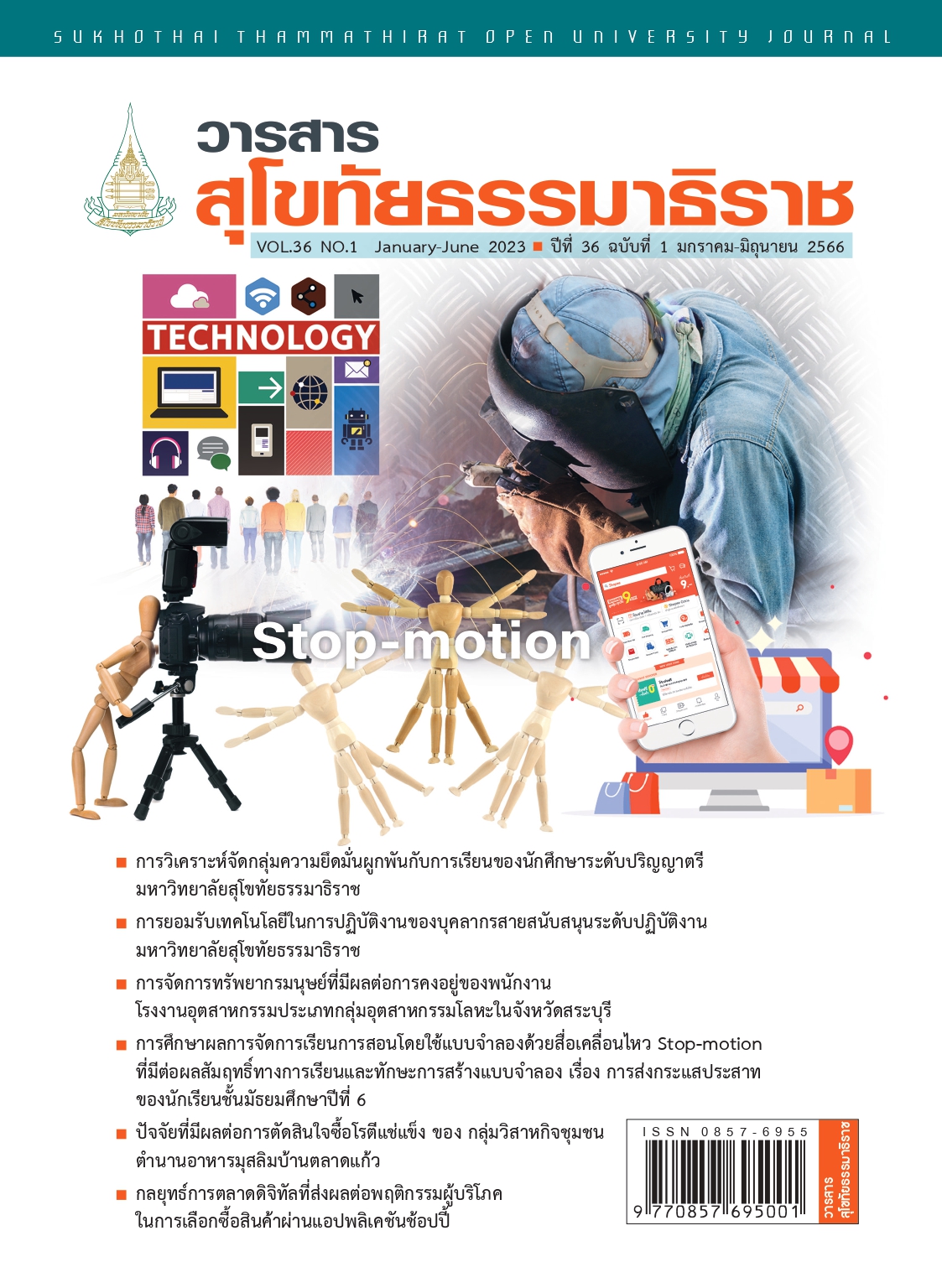การวิเคราะห์จัดกลุ่มความยึดมั่นผูกพันกับการเรียนของนักศึกษาระดับปริญญาตรี มหาวิทยาลัยสุโขทัยธรรมาธิราช
คำสำคัญ:
ความยึดมั่นผูกพันกับการเรียน, การศึกษาทางไกล, การวิเคราะห์จัดกลุ่มบทคัดย่อ
การวิจัยครั้งนี้มีจุดมุ่งหมายเพื่อ 1) ศึกษาระดับความยึดมั่นผูกพันกับการเรียน และ 2) เพื่อจัดกลุ่มนักศึกษาตามความยึดมั่นผูกพันกับการเรียน โดยกลุ่มตัวอย่างเป็นนักศึกษาระดับปริญญาตรี มหาวิทยาลัย สุโขทัยธรรมาธิราช จำนวน 1,211 คน ใช้การสุ่มกลุ่มตัวอย่างแบบแบ่งชั้นแบบไม่เป็นสัดส่วน เครื่องมือที่ใช้ในการวิจัยเป็นแบบวัดความยึดมั่นผูกพันกับการเรียนด้านความท้าทายทางวิชาการ, การเรียนรู้แบบลงมือปฏิบัติ, ปฏิสัมพันธ์ระหว่างนักศึกษากับอาจารย์, การส่งเสริมประสบการณ์ทางการศึกษา, สิ่งแวดล้อมที่สนับสนุนการเรียนรู้ และการบูรณาการเรียนกับการทำงานตามแนวคิดของโคตส์ สถิติที่ใช้ในการวิจัย คือการวิเคราะห์จัดกลุ่มแบบสองขั้นตอน (Two-Step Cluster Analysis) ผลการวิจัยพบว่า 1) นักศึกษามีความยึดมั่นผูกพันกับการเรียนในระดับมากทุกด้าน และ 2) ผลการจัดกลุ่มนักศึกษาตามความยึดมั่นผูกพันกับการเรียนคือ กลุ่มที่ 1 “นักศึกษามีความยึดมั่นผูกพันกับด้านการสนับสนุนจากมหาวิทยาลัย” และ กลุ่มที่ 2 “นักศึกษามีความยึดมั่นผูกพันกับการเรียนด้านมโนทัศน์ของผู้เรียน”
เอกสารอ้างอิง
Aeamtussana, T. (2017). Research and Development of Student Engagement Among Senior High School Students. Doctor of Philosophy Research and Development of Human Potential. Bangkok. Graduate School. Srinakharinwirot University.November, 2017.(in Thai).
Astin, A.W. (1984) Student Involvement: A Development Theory for Higher Education. Journal of college Student Development. 40(5), 518-529.
Ben, F., Price, T., Morrison, C., Warren, V., Gollan, W., Dunbar, R., Davies, F. & Sorrell, M. (2016). Overall student satisfaction at Tabor school of education: an examination of key factors based on the AUSSE SEQ. World Academy of Science, Engineering and Technology International Journal of Educational and Pedagogical Sciences. 10(10), 3324-3334.
Boonwatthanakul, C. (2016). Direction for Providing Nonformal and Informal Education for Thailand. Veridn E-Journal, Slipakorn University. 9(3), 984-1004. (in Thai).
Coates, H. (2008). Australasian Survey of Student Engagement: Institution report. ACER.
Daniel, J. (2011). Sampling essentials. Practical Guidelines for Making Sampling Choices. Sage Publishing.
Gunuc, S. (2014). The Relationships between Student Engagement and their Academic Achievement. International Journal on New Trends in Education and Their Implications, 5(19), 1309-6249.
Kahu, E. R., Stephens, C., Leach, L., & Zepke, N. (2013). The engagement of mature distance students. Higher Education Research & Development, 32(5), 791-804.
Kanchanawasee, S. Pitayanon, T. & Srisukhoi, D. (2008). Statistics of Research Reports. 5th , Bangkok Printing House of Chulalongkorn University. (in Thai).
Knowledge Network Institute of Thailand. (2010). Documents for Academic Seminars “Research for Teaching and Learning Development. No.3 Transformation to University 4.0” from http://www.knit.or.th/web Accessed December 19, 2010. (in Thai).
Knowles, M. S. (1984). The Modern Practice of Adult Education from Pedagogy to Andragogy.
Kuh, G.D., Kinzie, J., Buckley. J.A., Bridges, B.K. & Hayek, J.C. (2007). Piecing Together the Student Success Puzzle: Research, Propositions, and Recommendations. ASHE Higher Education Report, 32(5), 1-15.
Office of the Higher Education Commission. (2018). Strategies for Student Development in Higher Education Institutions. (2017-2021). May 2018. (in Thai).
Pace, C.R. (1982). Achievement and the Quality of Student Effort. Publisher: Washington, D.C. National Commission on Excellence in Education.
Parsons, J. & Taylor, L. (2011). Student engagement: what do we know and what should we do?. Retrieved October 24 2020. from https://docplayer.net/237109-Student-engagement- what-do-we-know-and-what-should-we-do.html.
Russell, B. & Slater, G.R L, (2011). Factors that Encourage Student Engagement; Insights From a Case Study of “First Time” Students in a New Zealand University. Journal of University Teaching & Learning Practive, 8(1), 81-95.
Sirikunpipat, P. Thaisiharat, P. Kongtham, A. & Sriymok, P. (2019). The Development of Mobile Learning Model for Sukhothai Thammathirat Open University Students. (in Thai).
Sungsri, S. (2015). Developing A Model of Educational Services Affecting the Success of Studying in the Distance Educational System: Case Studies of Sukhothai Thammathirat Open University and Open University Malaysia. 2015. (in Thai).
Tinto, V. (1975). Dropout from higher education: A theoretical synthesis of recent research. Review of Educational Research, 45(1), 89-125.
Tyler, R. W. (1949). Basic principles of curriculum and instruction. Chicago: University of Chicago Press.
ดาวน์โหลด
เผยแพร่แล้ว
รูปแบบการอ้างอิง
ฉบับ
ประเภทบทความ
สัญญาอนุญาต
ลิขสิทธิ์ (c) 2023 มหาวิทยาลัยสุโขทัยธรรมาธิราช

อนุญาตภายใต้เงื่อนไข Creative Commons Attribution-NonCommercial-NoDerivatives 4.0 International License.
บทความที่ได้รับการตีพิมพ์เป็นลิขสิทธิ์ของวารสารมหาวิทยาลัยสุโขทัยธรรมาธิราช
ข้อความที่ปรากฏในบทความแต่ละเรื่องในวารสารวิชาการเล่มนี้เป็นความคิดเห็นส่วนตัวของผู้เขียนแต่ละท่านไม่เกี่ยวข้องกับมหาวิทยาลัยสุโขทัยธรรมาธิราช และคณาจารย์ท่านอื่นๆในมหาวิทยาลัยฯ แต่อย่างใด ความรับผิดชอบองค์ประกอบทั้งหมดของบทความแต่ละเรื่องเป็นของผู้เขียนแต่ละท่าน หากมีความผิดพลาดใดๆ ผู้เขียนแต่ละท่านจะรับผิดชอบบทความของตนเองแต่ผู้เดียว
ห้ามนำข้อความทั้งหมด หรือบางส่วนไปพิมพ์ซ้ำ เว้นแต่จะได้รับอนุญาตจากกองบรรณาธิการวารสาร



